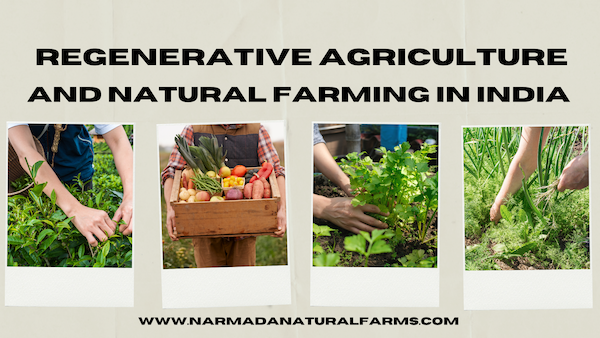Regenerative agriculture is a holistic approach to farming that seeks to restore and enhance the health of the soil, environment, and communities. In the context of Indian agriculture, where the sector plays a vital role in the livelihoods of millions, regenerative agriculture practices are gaining recognition and importance. One such practice that aligns with regenerative principles is natural farming, which aims to work in harmony with nature, rather than against it.
The State of Agriculture in India
India’s agricultural sector is the backbone of its economy, employing a significant portion of the population. Despite technological advances, agriculture in India has faced numerous challenges, including soil degradation, water scarcity, and the excessive use of chemical inputs. These issues have led to concerns about the sustainability of conventional farming methods, making the case for regenerative agriculture more compelling.
Also Read: How Does Hiring A Natural Farming Consultant Help Your Farm?
Regenerative Agriculture Principles
Regenerative agriculture emphasizes key principles that can transform conventional farming practices into sustainable and environmentally friendly systems. These principles include:
- Soil Health: Central to regenerative agriculture is the focus on nurturing soil health. Healthy soil teems with beneficial microorganisms and organic matter, which improve nutrient availability and water retention. Practices such as minimal tillage, cover cropping, and composting promote soil health.
- Biodiversity: A diverse ecosystem is a resilient ecosystem. Encouraging biodiversity by planting a variety of crops, including native species, and creating habitats for beneficial insects and wildlife is crucial to regenerative agriculture.
- Water Management: Efficient water use is vital in regions with water scarcity, such as many parts of India. Implementing methods like drip irrigation and rainwater harvesting can help conserve water resources.
- Natural Fertilizers: Reducing or eliminating synthetic fertilizers and pesticides in favour of organic alternatives is another key element. Natural farming methods prioritize the use of compost and organic matter to enrich the soil.
Also Read: How To Increase Organic Carbon At Your Farm?
Natural Farming in India
Natural farming, often associated with the teachings of Masanobu Fukuoka, a Japanese farmer and philosopher, has gained popularity in India as a form of regenerative agriculture. This farming approach goes beyond sustainability, focusing on minimal human intervention, maintaining harmony with nature, and enhancing soil and ecosystem health. Here are some key aspects of natural farming in India:
- No-Tillage Farming: In natural farming, farmers avoid tilling the soil, which disrupts the natural balance of the ecosystem. This reduces soil erosion and promotes soil health. As a result, it requires less labour and conserves energy and resources.
- Seed Saving and Indigenous Crops: Natural farmers prioritize saving seeds from their crops and growing indigenous varieties that are well-adapted to local conditions and promote biodiversity.
- Non-Selective Weeding: Instead of removing all weeds, natural farming encourages selective weeding, allowing beneficial weeds to grow alongside crops. This approach minimizes soil disturbance and encourages natural pest control.
- Minimal External Inputs: Natural farming reduces reliance on external inputs such as synthetic fertilizers and pesticides. Instead, it emphasizes the use of compost, organic matter, and other on-farm resources.
- Crop Rotation and Polyculture: Crop rotation and mixed cropping are common practices in natural farming. These methods help reduce pests and diseases, as well as enhance soil fertility.
Benefits of Regenerative Agriculture and Natural Farming in India
The adoption of regenerative agriculture and natural farming practices in India can yield several benefits:
- Increased Soil Fertility: Improving soil health through these practices results in enhanced fertility, reducing the need for chemical inputs.
- Water Conservation: Natural farming techniques, such as mulching and efficient irrigation, help conserve water, which is critical in regions with water scarcity.
- Biodiversity Conservation: Natural farming promotes biodiversity, creating habitats for beneficial insects and wildlife, which can aid in pest control.
- Lower Input Costs: By reducing reliance on synthetic inputs, farmers can cut their production costs, increasing profitability.
- Climate Resilience: Regenerative agriculture practices enhance the soil’s ability to sequester carbon, making farming more resilient to climate change.
- Improved Nutrition: Growing indigenous and diverse crops can result in more nutritious and culturally significant food.
Also Read: Natural Farming Consultancy
Challenges in Adoption
While regenerative agriculture and natural farming offer numerous benefits, there are challenges to their widespread adoption in India. These include:
- Lack of Awareness: Many farmers are unaware of regenerative practices and the benefits they offer.
- Initial Transition: Shifting from conventional to regenerative methods can be a significant transition that requires time, effort, and support.
- Market Access: Access to markets for natural and organic produce can be limited, making it challenging for farmers to sell their products at competitive prices.
- Education and Training: Adequate training and extension services are crucial for the successful adoption of these practices.
Regenerative agriculture and natural farming hold immense potential to transform the Indian agricultural landscape. By focusing on soil health, biodiversity, and sustainability, these practices can address the challenges facing Indian agriculture. To realize this potential, there is a need for increased awareness, training, and policy support to encourage farmers to adopt these methods. Ultimately, regenerative agriculture and natural farming can not only improve the livelihoods of Indian farmers but also contribute to a more sustainable and resilient agricultural sector for the nation.
***
Please send a WhatsApp message to 9303539939 or an email to narmadanaturalfarms@gmail.com for more details on consultancy, webinars, or to purchase produce/seeds.

Very informative
Very Well Explained Sankalp ji, Thanks for Sharing